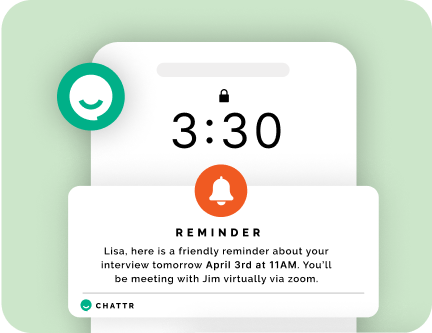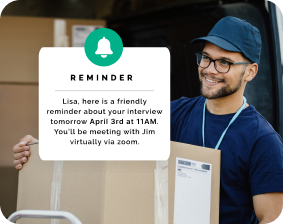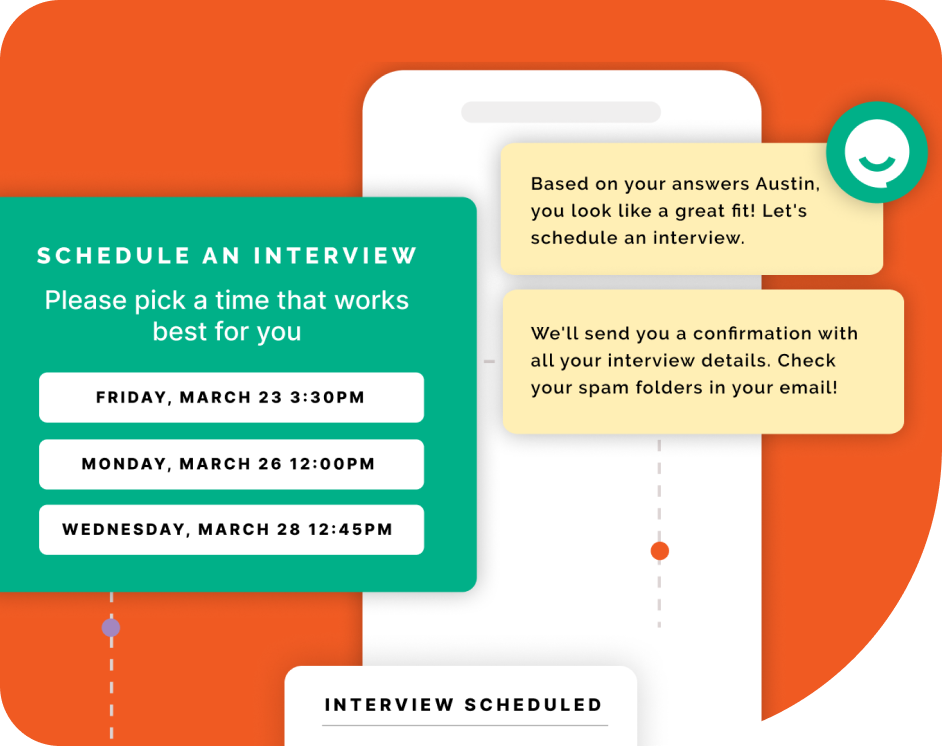Have you ever had to deal with a no-show as a hiring manager? If you have, then you know how frustrating it can be. No-shows waste your time, but they also waste the time of the candidates who are interviewed for the role, which can be highly costly for your business. In this blog post, we will discuss why no-shows are such a big problem, and we will provide recommendations on how to cut down on them and incentivize top candidates to pursue the role.
No Shows Are Wasting Your Time And Money – Here’s How To Cut Down On Them
No shows are wasting your time and money in your hiring process. By failing to show up for interviews or job fairs, they miss out on valuable opportunities and waste time and resources of potential employers.
These no-shows leave hiring managers with unfilled positions, but they also create a highly inefficient process that can negatively impact the entire organization. To tackle this problem, companies must provide applicants with clear instructions about the interview or job fair, including how to get there and when to arrive.
Furthermore, managers should remain diligent about tracking no-shows to identify behavior patterns and more effectively address this issue in the future.
In short, no shows present a significant challenge for recruiters and employers alike. Still, by taking proactive steps to combat them, we can ensure that our hiring process is more efficient and effective in the long run.
Understand The Reasons Why People No Show
To reduce the number of no-shows, it’s essential to understand why they happen in the first place.
People often no-show interviews for a variety of reasons. Common factors may include not having enough time to prepare for the interview or a lack of interest in the position from the candidate’s perspective.
Typical reasons might include offering an inappropriate date and time or poor communication during the hiring process on the recruiter’s side.
Regardless of who is at fault, no-shows can negatively affect both parties. Candidates lose out on a valuable opportunity and potentially damage their reputation within the industry. For recruiters, they lose time and money and damage their company’s employer brand by leaving candidates with a negative impression of their organization.
Another reason candidates fail to show up for an interview is that they feel disrespected by the process; because as much as they may want the job, they may not feel like the job wants or needs them.
The way a company communicates with candidates can have a big impact on whether or not they decide to show up for an interview. If a candidate feels like they are being treated disrespectfully or that their time is not valued, they are much less likely to want to go through with the interview.
Ultimately, effective communication throughout the interview process is key to minimizing no-shows and ensuring a positive outcome for all involved.
Implement Solutions To Reduce The Number Of No Shows
There are several ways to reduce the number of no-shows to an interview. One way is to send a confirmation email or text message to the candidate a few days before the interview. This will serve as a reminder and help them remember the interview’s date and time.
Another way to reduce no-shows is to have a second interviewer present for the initial screening interviews. This will serve as a backup if the first interviewer cannot make it to the meeting.
Finally, you can try offering a small incentive, such as a gift card, for candidates who show up for their interviews on time. By taking these steps, you can help to ensure that more candidates will make it to their interviews and be better prepared when they do.
Tips For Reducing The Number Of No Shows In Your Business
Since no-shows are a huge issue for employers- costing time and money; here are a few solutions to help reduce the number of no-shows to your interviews:
1. We may be a little biased but the best way to eliminate no-shows is to implement Chattr. Chattr is an end-to-end hiring solution that will automate the majority of your hiring tasks and virtually eliminate no-shows by engaging with applicants via text and scheduling interviews for you.
2. Make sure you’re clear about the expectations of the role in the interview. Candidates are more likely to show up if they know what they’re walking into and whether or not the role is a good fit for them.
3. Get creative with your interview locations. If you hold interviews in a coffee shop or other public space, candidates are less likely to bail since they’ve already made an effort to leave their house.
4. Keep candidates engaged after their interview by sending a follow-up email or text within 24 hours. Thank them for their time and express interest in moving forward in the hiring process. This will help remind them that they are committed to you and increase the likelihood of showing up for future interviews.
Track Your Progress And Tweak Your Solutions As Needed
Tracking your progress is essential in implementing solutions to reduce no-shows at your job interviews. By observing and recording the results of our efforts, we can gain valuable insight into what works and what doesn’t, helping us to hone and improve our strategies over time.
For example, by tracking the rate of no-shows before and after implementing a new reminder system, we can see if this particular solution helped reduce the number of missed interviews. And by analyzing other factors such as messaging preferences or scheduling times, we may gain even further insight into relevant trends that can inform future improvements.
Here is a sample process you can implement to track your progress:
First, dedicate some time to systematically reviewing data about past no-shows. This may involve digging through records from past interviews or contacting previous job candidates to see why they didn’t show up for their appointments. With this information in hand, you can analyze trends and identify possible causes for these events, such as poor communication on your part or low candidate motivation levels.
Once you have identified the root causes of your no-shows, you should then work to implement some solutions that help address these issues. For example, you may want to start by changing parts of your interview process that seem likely to lead to missed appointments – such as scheduling phone interviews at inconvenient times – and then tracking whether these changes result in fewer no shows overall. By tracking your progress throughout this process and tweaking your solutions as needed, you can effectively reduce no shows and improve the success of
Overall, keeping track of our progress will help us consistently refine and enhance our solutions to reduce no-shows and ultimately reach our goals.
What To Do If An Applicant Cancels An Appointment With Short Notice
As any hiring manager can attest, it can be frustrating when an applicant cancels a job interview at the last minute. This puts the hiring manager in an awkward position, but it also wastes valuable time to interview more qualified candidates.
To avoid canceled appointments and to ensure that all applicants are treated fairly and equally, there are a few steps that you can take as a hiring manager.
One strategy is to ask applicants to provide notice if they need to reschedule their interview. This gives you plenty of time to find another candidate or reschedule your schedule in response. Additionally, if an applicant is frequently canceling or arriving late for interviews, you may want to take them out of consideration altogether.
After all, this behavior suggests that they might not be reliable or responsible enough for the job. At the same time, it’s important to remain professional and fair throughout the process – even if an applicant cancels their interview at the last minute, always respond promptly and stay courteous when communicating with them about rescheduling.
By following these simple guidelines as a hiring manager, you can help prevent canceled interviews while ensuring that you maintain fairness and professionalism during your hiring process.
How To Politely Follow Up With Applicants Who Have Missed Their Appointment
One of the most important aspects of any recruitment process is following up with applicants who have missed their scheduled appointment. Whether it’s an interview or informational session, it is essential to maintain clear and consistent communication with these candidates throughout the entire recruitment journey.
This allows you to keep track of your applicants and gauge their level of interest and lets them know where they stand in the process and what they can expect going forward.
There are many polite yet effective ways to follow up with applicants who have missed their appointment. For example, you could send a quick email reminder a day or two before their original interview date or even a short phone call offering some additional guidance about preparing for the interview or other steps before coming into your office.
Additionally, you could include information in this email about different candidates who would be ideal fits for the role at hand, highlighting why these individuals would be better suited for the position than those who missed their appointment.
And finally, it is always important to be transparent and honest in your messaging when communicating with candidates – people want to know where they stand in the process, so keeping them abreast of any updates or developments is key.
By following these simple tips, you can help ensure that your recruitment process runs smoothly while also building goodwill with your applicants.
The Takeaway
No shows are costing you and your team time, which is expensive. By tracking your progress and tweaking your solutions as needed, you can effectively reduce no-shows and improve the success of your hiring process. Additionally, you can ensure that your recruitment process is successful by being proactive and taking the necessary steps to incentivize top candidates.
At Chattr, we have created an end-to-end solution that screens candidates, schedules interviews, and engages applicants via text to eliminate no-shows. Let’s connect and discuss how Chattr can make the headaches caused by no-shows a thing of the past!












